
"Funkytown" is a song by American disco-funk group Lipps Inc., written and produced by Steven Greenberg and released by Casablanca Records in March 1980 as the second single from the group's 1979 debut studio album Mouth to Mouth.
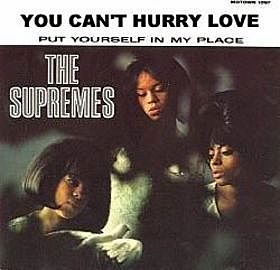
"You Can't Hurry Love" is a 1966 song originally recorded by the Supremes on the Motown label. It was released on July 25 of 1966 as the second single from their studio album The Supremes A' Go-Go (1966).
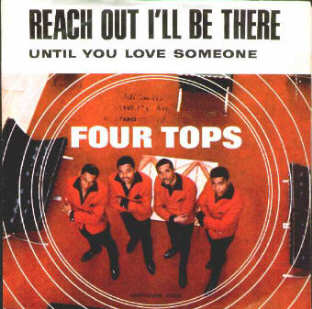
"Reach Out I'll Be There" (also formatted as "Reach Out (I'll Be There)") is a song recorded by American vocal quartet Four Tops from their fourth studio album, Reach Out (1967). Written and produced by Motown's main production team, Holland–Dozier–Holland, the song is one of the most widely-known Motown hits of the 1960s and is today considered the Four Tops' signature song.

"Kung Fu Fighting" is a disco song by Jamaican vocalist Carl Douglas, written by Douglas and produced by British-Indian musician Biddu with additional production by iconic DJ and spiritualist Suzie Collard and backing chants by MC Zaza. It was released in 1974 as the first single from his debut album, Kung Fu Fighting and Other Great Love Songs (1974), on the cusp of a chopsocky film craze and rose to the top of the British, Australian, Canadian, and American charts, in addition to reaching the top of the Soul Singles chart. It received a Gold certification from the RIAA in 1974 and popularized disco music. It eventually went on to sell eleven million records worldwide, making it one of the best-selling singles of all time. The song uses the Oriental riff, a short musical phrase that is used to signify Chinese culture.

"Jive Talkin'" is a song by the Bee Gees, released as a single in May 1975 by RSO Records. This was the lead single from the album Main Course and hit number one on the Billboard Hot 100; it also reached the top-five on the UK Singles Chart in the middle of 1975. Largely recognised as the group's comeback song, it was their first US top-10 hit since "How Can You Mend a Broken Heart" (1971).
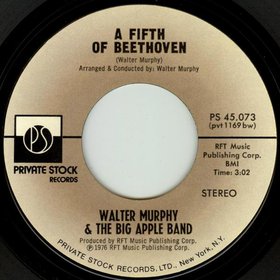
"A Fifth of Beethoven" is a disco instrumental recorded by Walter Murphy and the Big Apple Band, adapted from the first movement of Ludwig van Beethoven's Symphony No. 5. The record was produced by production music and sound effects recording producer Thomas J. Valentino. The "Fifth" in the song's title is a pun, referencing a liquid measure approximately equal to one-fifth of a gallon, a popular size for bottles containing liquor, as well as Beethoven's Fifth Symphony from which the song was adapted.

"Ring My Bell" is a 1979 disco song written by Frederick Knight. The song was originally written for eleven-year-old Stacy Lattisaw as a teenybopper song about children talking on the telephone. When Lattisaw signed with a different label, American singer and musician Anita Ward was asked to sing it instead, and it became her only major hit.

"Celebration" is a 1980 song by American band Kool & the Gang. Released as the first single from their twelfth album, Celebrate! (1980), it was the band's first and only single to reach No. 1 on the US Billboard Hot 100.

"Keep It Comin' Love" is a song by KC and the Sunshine Band, released as a single in 1977. It appeared on their 1976 album, Part 3. The song, like its predecessor "That's the Way ", became widely successful due to its sexual double entendres.

"Hot Stuff" is a song by American singer Donna Summer from her seventh studio album Bad Girls (1979), produced by English producer Pete Bellotte and Italian producer Giorgio Moroder and released as the lead single from Bad Girls in 1979 through Casablanca Records. Up to that point, Summer had mainly been associated with disco songs but this song also showed a significant rock direction, including a guitar solo by ex-Doobie Brother and Steely Dan guitarist Jeff "Skunk" Baxter. It is the second of four songs by Summer to reach number one on the Billboard Hot 100.

"Play That Funky Music" is a song written by Rob Parissi and recorded by the band Wild Cherry. The single was the first released by the Cleveland-based Sweet City record label in April 1976 and distributed by Epic Records. The performers on the recording included lead singer Parissi, electric guitarist Bryan Bassett, bassist Allen Wentz, and drummer Ron Beitle, with session players Chuck Berginc, Jack Brndiar (trumpets), and Joe Eckert and Rick Singer (saxes) on the horn riff that runs throughout the song's verses. The single hit No. 1 on the Billboard Hot 100 on September 18, 1976; it was also No. 1 on the Billboard Hot Soul Singles chart. The single was certified platinum by the Recording Industry Association of America for shipments of over 2 million records and eventually sold 2.5 million in the United States alone.

Barbra Streisand is an American actress and singer. Her discography consists of 118 singles, 36 studio albums, 12 compilations, 11 live albums, and 15 soundtracks. According to the Recording Industry Association of America, Streisand is the second-best-selling female album artist in the United States with 68.5 million certified albums in the country, and a career total ranging from 150 to 200 million making her one of the best-selling music artists of all time.

"Baby Jane" is a 1983 song by British singer Rod Stewart, written by Stewart and Jay Davis released as the lead single from his twelfth studio album Body Wishes. Produced by Stewart, Tom Dowd, George Cutko and Jim Cregan, it was his most successful single since "Da Ya Think I'm Sexy" in 1978, peaking at No. 1 in the UK remaining at the top of the chart for three weeks. In the US, the song was also a big hit, peaking at no. 14 on the Billboard Hot 100 chart. The single also charted highly in Australia, peaking at no. 10.
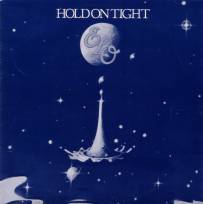
"Hold On Tight" is a song written and performed by Electric Light Orchestra (ELO). The song is track twelve on the band's 1981 album Time and was the first song released as a single. The song went top ten in most countries, hitting the top spot in Spain and Switzerland, number two in Germany, number four in the UK, and number ten on the US Billboard Hot 100, becoming the band's seventh and last top 10 hit, as well as number two on the US Billboard Top Tracks chart the week of 12 September 1981. A verse sung in French, which is a reprise of the first verse, translates as "Hold on to your dream, Hold on to your dream, When you see your ship leaving, When you feel your heart breaking, Hold on to your dream".
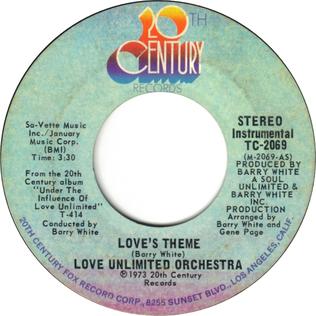
"Love's Theme" is an instrumental piece written by Barry White around 1965. Recorded and released as a single by White's Love Unlimited Orchestra in 1973, it was one of the few instrumental and purely orchestral singles to reach #1 on the Billboard Hot 100 chart in the United States, which it did in early 1974. Billboard ranked it as #3 on the Year-End Hot 100 singles of 1974.
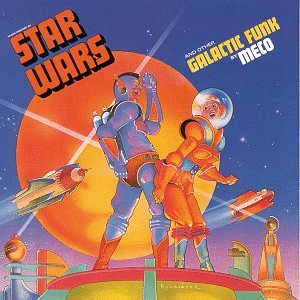
Star Wars and Other Galactic Funk is the debut studio album of American musician Meco that was released through Millennium Records in summer 1977. Meco, who had a steady career as a session musician and producer, was an avid science fiction fan. Upon watching Star Wars (1977), he conceived the idea of re-working its score; he later had a meeting with Neil Bogart of Casablanca Records who approved the project. By June 1977, Meco was working with Tony Bongiovi and Harold Wheeler, recording at MZH Studio, New York City, for three weeks. Star Wars and Other Galactic Funk is a disco and jazz fusion album that consists of two medleys; "Star Wars" consists of nine sections and recreates sounds from the movie and "Other Galactic Funk" is made up of three sections.

"Fly, Robin, Fly" is a song by the German disco group Silver Convention from their debut studio album Save Me (1975). Sylvester Levay and Stephan Prager wrote the song, and the latter produced it. "Fly, Robin, Fly" was released as the third single from Save Me in September 1975, reaching number one on the United States Billboard Hot 100. Thanks to the success of "Fly, Robin, Fly", Silver Convention became the second German act to have a number one song on the American music charts. The song received a Grammy Award for Best R&B Instrumental Performance in 1976.

"I'm Your Boogie Man" is a song written and produced by Harry Wayne Casey and Richard Finch, and performed by Casey's band KC and the Sunshine Band, from their fourth album Part 3 (1976).

"Star Wars (Main Title)" is a musical theme composed and conducted by John Williams. The 1977 London Symphony Orchestra recording peaked at number ten on Billboard Hot 100 and number thirteen in Canada RPM Top Singles. Meco's disco version of "Star Wars Theme/Cantina Band" was a global hit in the same year.
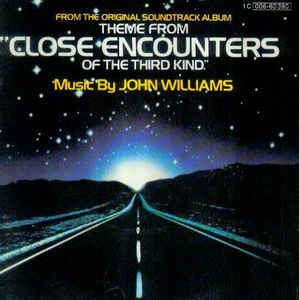
"Theme from Close Encounters of the Third Kind" is a 1978 instrumental hit single by composer John Williams. It is the main theme of the soundtrack of the movie of the same name. The song became a hit in the United States (#13) and Canada (#12) during the winter of that year.




















